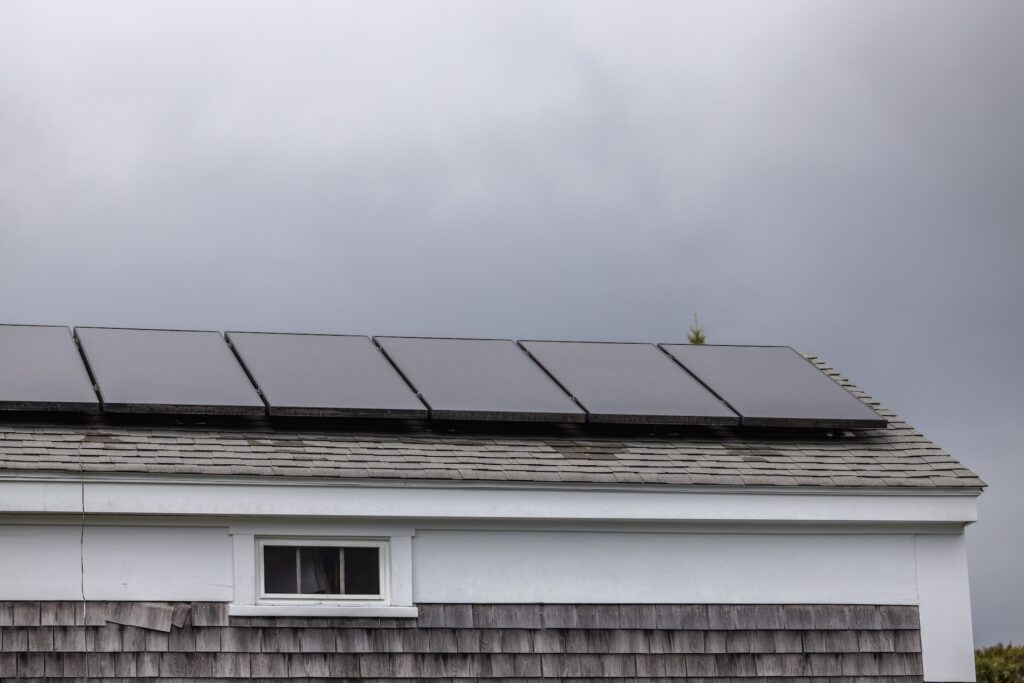
If you’re thinking about installing solar panels for your home, there are several incentives you can take advantage of to reduce your upfront costs and help you save more money over time. One of the best incentives for solar panel installation in Massachusetts is net metering.
In this guide, we explain everything you need to know about solar net metering in Massachusetts, including how it works, its many benefits, and valuable tips for maximizing your savings.
How Does Net Metering Work?
Net metering is a billing arrangement between you and your electricity provider. It allows you to earn utility credit for the excess solar electricity you generate and export to the grid. Here’s how it works:
- Generate electricity – Your solar panels generate a lot of electricity during the day—often more than you can use at once.
- Export excess electricity to the grid – When your solar panels produce more electricity than you can use at once, the excess power is automatically sent to the electric grid.
- Tracking – A bi-directional electric meter keeps track of the power you take from the grid and the power you send into it. When you take power from the grid, your meter spins forward. When you send power into the grid, your meter spins backward.
- Utility credit accumulation – When you send more electricity to the grid than you take from it, you earn credit with your utility company.
- Using your credits – When your solar panels are not producing enough electricity, you can use your net metering credits to offset the cost of the power you buy from the electric grid.
In Massachusetts, your net metering credits never expire. You can roll them over from month to month and use them whenever you need them. That means you can bank credits in the summer when the days are long and sunny and use them in the winter when the days are short and you need more grid power.
What Are the Benefits of Net Metering?
Net metering is one of the best solar incentives available. It allows you to benefit from solar power at all times, not just when it’s sunny. This leads to many benefits, including:
Increase Electric Bill Savings
By earning utility credit for excess solar energy sent to the grid, you can offset the cost of power you buy from the grid at night and on cloudy days. This can significantly reduce or even eliminate your electricity usage costs.
Faster Payback Period
Solar panels pay for themselves through electric bill savings. The amount of time it takes for your savings to outweigh your initial investment is known as your payback period. Net metering helps you save more money with solar, which, in turn, speeds up your payback period so you can start profiting from your investment.
Reduced Carbon Footprint
When you net meter, you’re sending clean, renewable energy into the electric grid. This reduces your reliance on fossil fuels, lowers carbon emissions, and contributes to a cleaner, more sustainable energy grid.
Who’s Eligible for Net Metering in Massachusetts?
To participate in net metering in Massachusetts, you must be a customer of a regulated utility company (Eversource, National Grid, and Unitil). Your solar panel system must also:
- Be no larger than 2 MW (virtually all residential solar panel systems meet this requirement)
- Be connected to the electric grid (off-grid systems can’t net meter)
- Meet all interconnection rules and regulations set by your utility company (we will make sure your system complies before connecting it to the electric grid)
Tips to Maximize Savings with Net Metering
We are lucky to have net metering here in Massachusetts. It significantly increases the value of rooftop solar, helping you save more, faster. To make the most of net metering and optimize your savings, consider the following tips:
- Right-Sizing Your Solar Panel System – An appropriately sized solar power system will help you generate enough electricity to cover your consumption and earn maximum credits through net metering.
- Time your energy usage – Be mindful of peak demand periods when electricity rates are higher. By shifting your energy-intensive activities, such as charging electric vehicles, to off-peak hours, you can maximize the credits earned through net metering.
- Embrace energy efficiency – Implement energy-saving practices in your home, such as using energy-efficient appliances, optimizing insulation, and sealing air leaks. By reducing your overall energy consumption, you can further enhance your savings with net metering.
Net metering enhances the benefits of solar panels, making them even more valuable for Massachusetts homeowners. If you’re thinking about installing solar panels for your home, Neeeco is here to guide you every step of the way. We can help you learn more about solar incentives like net metering and break down what the potential savings will look like for your home.
